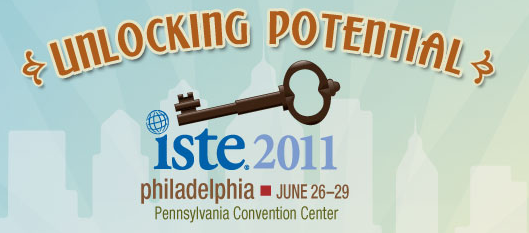Renee Hobbs, Kristin Hokanson and Spiro Bolos are offering a day-long seminar, "Leading the Way to Copyright Clarity" at the ISTE Conference in Philadelphia on Sunday, June 26, 2011, from 8:30 - 3:30. The fee for this program is $199 ($219 after May 1).
Register for this special event NOW!
 Purpose & Objectives. After completing this workshop, participants will be able to:
Purpose & Objectives. After completing this workshop, participants will be able to:
• Explain how copyright and fair use apply to digital learning
• Use the Code of Best Practices to guide better decision-making about how
fair use applies to instructional practices in K-12 education
• Learn how to teach others about copyright and fair use
• Offer presentations about copyright and fair use in K-12 education
• Become an advocate for copyright and fair use
Outline
The program structure includes an introductory lecture to help participants understand the purpose of copyright, the doctrine of fair use, the historical context of the development of educational use guidelines, the concept of transformativeness, and the development of the Code of Best Practices for Fair Use in Media Literacy Education.
Next, participants get practice in applying fair use reasoning to various hypothetical scenarios in digital learning in K-12 settings by working in small groups to discuss and analyze common situations where students and teachers use copyrighted materials for digital learning Facilitators also share specific examples of classroom assignments where students made use of copyrighted material in creating their own work. Participants then work with a partner to review the main ideas of the program and develop explanations and interpretations that connect to their own experience and work environment. Using their own laptops, participants create a simple digital screencast to practice explaining their understanding of key concepts of copyright law as it applies to digital learning.
Using video and web examples, we share specific classroom situations and illustrate various instructional practices for teaching about copyright and fair use with students of different ages. Some of these methods include: viewing and discussion of case study videos of classroom practice and modeling the fair use reasoning process through the use of hypothetical scenarios.
Finally, each participant, working with a partner, makes a brief presentation to the entire group about a specific issue in copyright and digital learning. This enables participants to internalize key ideas, gain practice in sharing these ideas with an audience, and strengthen confidence in offering a "leadership voice" on the issue.
Supporting Research
This program has been proven to be effective in helping educators develop confidence in offering professional development programs on the issue of copyright and fair use. We have offered this day-long workshop to educators during the summer of 2010 in Philadelphia. Participants were asked to provide an evaluation of the extent to which the program had accomplished its learning objectives using a Likert scale where 10 represents “strongly agree” and 0 represents “strongly disagree.” Teachers agreed that they could explain how copyright and fair use applied to digital learning (M = 8.7) and saw themselves as advocates for copyright and fair use (M = 8.7). Educators also agreed that they could use the Code of Best Practices to guide decision-making about how fair use applies to their work (M = 8.5) and teach others about copyright and fair use (M = 8.6). The most challenging learning objective, creating workshop presentations (M = 8.4) although fairly high, was the lowest-ranked of the items, perhaps due to more variation among participants in their confidence in public speaking. The full program evaluation report is available online.
References
Hobbs, Renee (2010). Copyright Clarity: How Fair Use Supports Learning in a Digital Age (Thousands Oaks, CA: Corwin/Sage).
Hobbs, R., Jaszi, P. and Aufderheide, P. (2009). How media literacy educators reclaimed copyright and fair use. International Journal of Learning and Media 1(3): 33 – 48.
Hobbs, R. and Donnelly, K. (in press). Towards a pedagogy of fair use for multimedia composition. In D. DeVoss & M. C. Rife (Eds.). Copy(write): Intellectual Property in the Writing Classroom. West Lafayette, IN: Parlor Press.
Hobbs, R. (2008). Debates and challenges facing new literacies in the 21st century. In Sonia Livingstone and Kristin Drotner (Eds.), International Handbook of Children, Media and Culture. London: Sage (pp. 431 – 447).